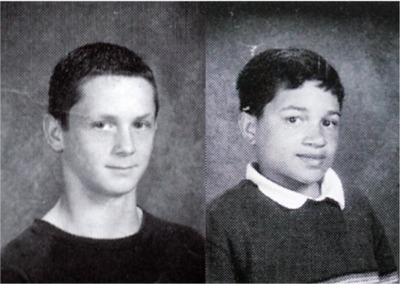BY ROB SALERNO – The case of the 2008 murder of 15-year-old Larry King is finally closed, as his murderer Brandon McInerney has agreed to plea guilty to second-degree murder with a gun, which carries an automatic sentence of 21 years with no possibility of parole and no credit for time already served in the state of California.
![]()

McInerney (above, left), a burgeoning white supremacist, shot King (right) several times in their school’s computer lab, apparently outraged at King’s gay appearance and behaviour. His lawyers employed the “gay panic defence” during his first trial, arguing that McInerney was brought to a breaking point by King’s aggressively gay behaviour and unwanted sexual advances — meaning he gave McInerney a Valentine on Valentine’s Day. You know, because it’s okay to murder gay people in cold blood if they look at you funny.
The first trial resulted in a hung jury — jurors were unable to decide if McInerney was guilty of manslaughter or murder, by a margin of seven to five. The plea bargain puts McInerney, who’s been in jail since he was 14, behind bars until he’s 38. Prosecutors had initially sought a 25-to-life term, including a hate-crime addition.
Under the terms of the plea bargain, King’s murder isn’t a hate crime. McInerney pleas guilty to second-degree murder, but the conviction will be stayed and he will instead receive the penalty for voluntary manslaughter. Which essentially means that the record shows that the court agrees that McInerney can’t be fully culpable for King’s murder because King provoked McInerney. It’s infuriating that this is the outcome of the whole ordeal.
King’s father says the 21-year sentence isn’t “justice.”
What would be justice?
McInerney was 14 when he committed the crime. In Canada, we wouldn’t be able to name him. Even if found guilty of murder with a hate-crime addition, he would face only a 10-year sentence with intensive rehabilitation, unless an adult sentence was sought. (Note, under the Conservatives’ omnibus crime bill, it would be easier to charge children as adults and name them.)
And rehabilitation is probably what’s needed here most of all. McInerney will be back on the street when he’s 38, after spending 24 years in prison with other white supremacists and other bad influences. Then what?
Both McInerney and King came from rough upbringings. According to MSNBC:
“King had been in foster care at a centre for abused and neglected children
since November, said Steve Elson, the facility’s chief executive.Confidentiality laws prevented him from saying why.
McInerney’s parents accused each other of domestic violence and filed duelling
restraining orders, according to court records. Several months before McInerney
was born, his father was accused of shooting his mother in the elbow. Kendra
McInerney told a local paper she struggled with drug addiction for many years.”
It’s not surprising that McInerney was so screwed up, given his parents. And while a 14-year-old should understand that murder is wrong, we also know that 14-year-old boys aren’t great at understanding the consequences of their actions in the best of circumstances.
What’s needed is strong but compassionate justice that sends the message that what McInerney did was wrong but that takes as its aim correcting his behaviour and making him a functional adult upon his release.
With an adult sentence that clouds McInerney’s responsibility for his crime under a veil of gay panic, California has arrived at the worst possible conclusion, one that doesn’t let McInerney off completely.

 Why you can trust Xtra
Why you can trust Xtra


